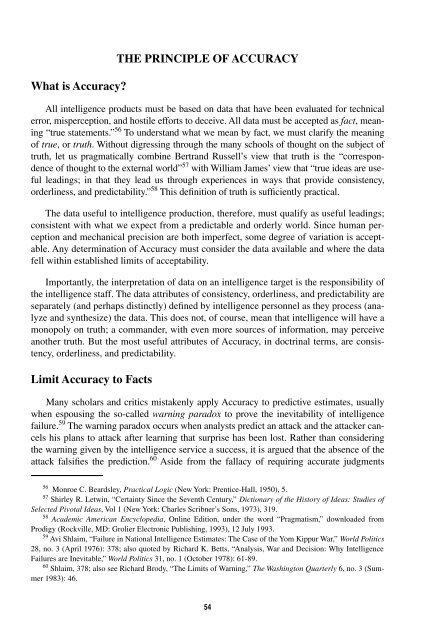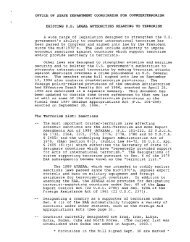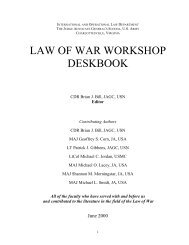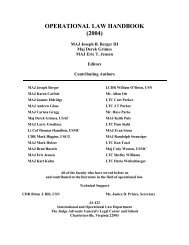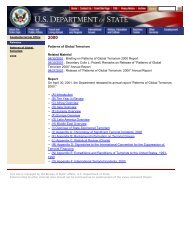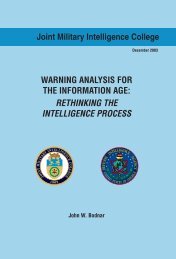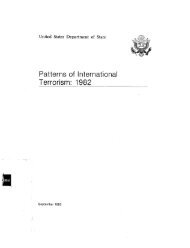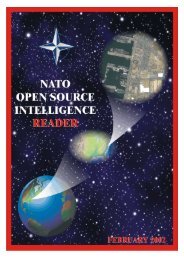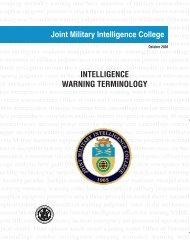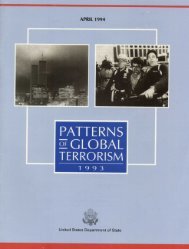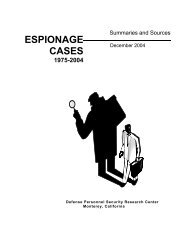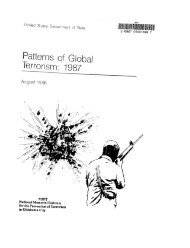learning with professionals - Higgins Counterterrorism Research ...
learning with professionals - Higgins Counterterrorism Research ...
learning with professionals - Higgins Counterterrorism Research ...
You also want an ePaper? Increase the reach of your titles
YUMPU automatically turns print PDFs into web optimized ePapers that Google loves.
What is Accuracy?<br />
THE PRINCIPLE OF ACCURACY<br />
All intelligence products must be based on data that have been evaluated for technical<br />
error, misperception, and hostile efforts to deceive. All data must be accepted as fact, meaning<br />
“true statements.” 56 To understand what we mean by fact, we must clarify the meaning<br />
of true, or truth. Without digressing through the many schools of thought on the subject of<br />
truth, let us pragmatically combine Bertrand Russell’s view that truth is the “correspondence<br />
of thought to the external world” 57 <strong>with</strong> William James’ view that “true ideas are useful<br />
leadings; in that they lead us through experiences in ways that provide consistency,<br />
orderliness, and predictability.” 58 This definition of truth is sufficiently practical.<br />
The data useful to intelligence production, therefore, must qualify as useful leadings;<br />
consistent <strong>with</strong> what we expect from a predictable and orderly world. Since human perception<br />
and mechanical precision are both imperfect, some degree of variation is acceptable.<br />
Any determination of Accuracy must consider the data available and where the data<br />
fell <strong>with</strong>in established limits of acceptability.<br />
Importantly, the interpretation of data on an intelligence target is the responsibility of<br />
the intelligence staff. The data attributes of consistency, orderliness, and predictability are<br />
separately (and perhaps distinctly) defined by intelligence personnel as they process (analyze<br />
and synthesize) the data. This does not, of course, mean that intelligence will have a<br />
monopoly on truth; a commander, <strong>with</strong> even more sources of information, may perceive<br />
another truth. But the most useful attributes of Accuracy, in doctrinal terms, are consistency,<br />
orderliness, and predictability.<br />
Limit Accuracy to Facts<br />
Many scholars and critics mistakenly apply Accuracy to predictive estimates, usually<br />
when espousing the so-called warning paradox to prove the inevitability of intelligence<br />
failure. 59 The warning paradox occurs when analysts predict an attack and the attacker cancels<br />
his plans to attack after <strong>learning</strong> that surprise has been lost. Rather than considering<br />
the warning given by the intelligence service a success, it is argued that the absence of the<br />
attack falsifies the prediction. 60 Aside from the fallacy of requiring accurate judgments<br />
56 Monroe C. Beardsley, Practical Logic (New York: Prentice-Hall, 1950), 5.<br />
57 Shirley R. Letwin, “Certainty Since the Seventh Century,” Dictionary of the History of Ideas: Studies of<br />
Selected Pivotal Ideas, Vol 1 (New York: Charles Scribner’s Sons, 1973), 319.<br />
58 Academic American Encyclopedia, Online Edition, under the word “Pragmatism,” downloaded from<br />
Prodigy (Rockville, MD: Grolier Electronic Publishing, 1993), 12 July 1993.<br />
59 Avi Shlaim, “Failure in National Intelligence Estimates: The Case of the Yom Kippur War,” World Politics<br />
28, no. 3 (April 1976): 378; also quoted by Richard K. Betts, “Analysis, War and Decision: Why Intelligence<br />
Failures are Inevitable,” World Politics 31, no. 1 (October 1978): 61-89.<br />
60 Shlaim, 378; also see Richard Brody, “The Limits of Warning,” The Washington Quarterly 6, no. 3 (Summer<br />
1983): 46.<br />
54


